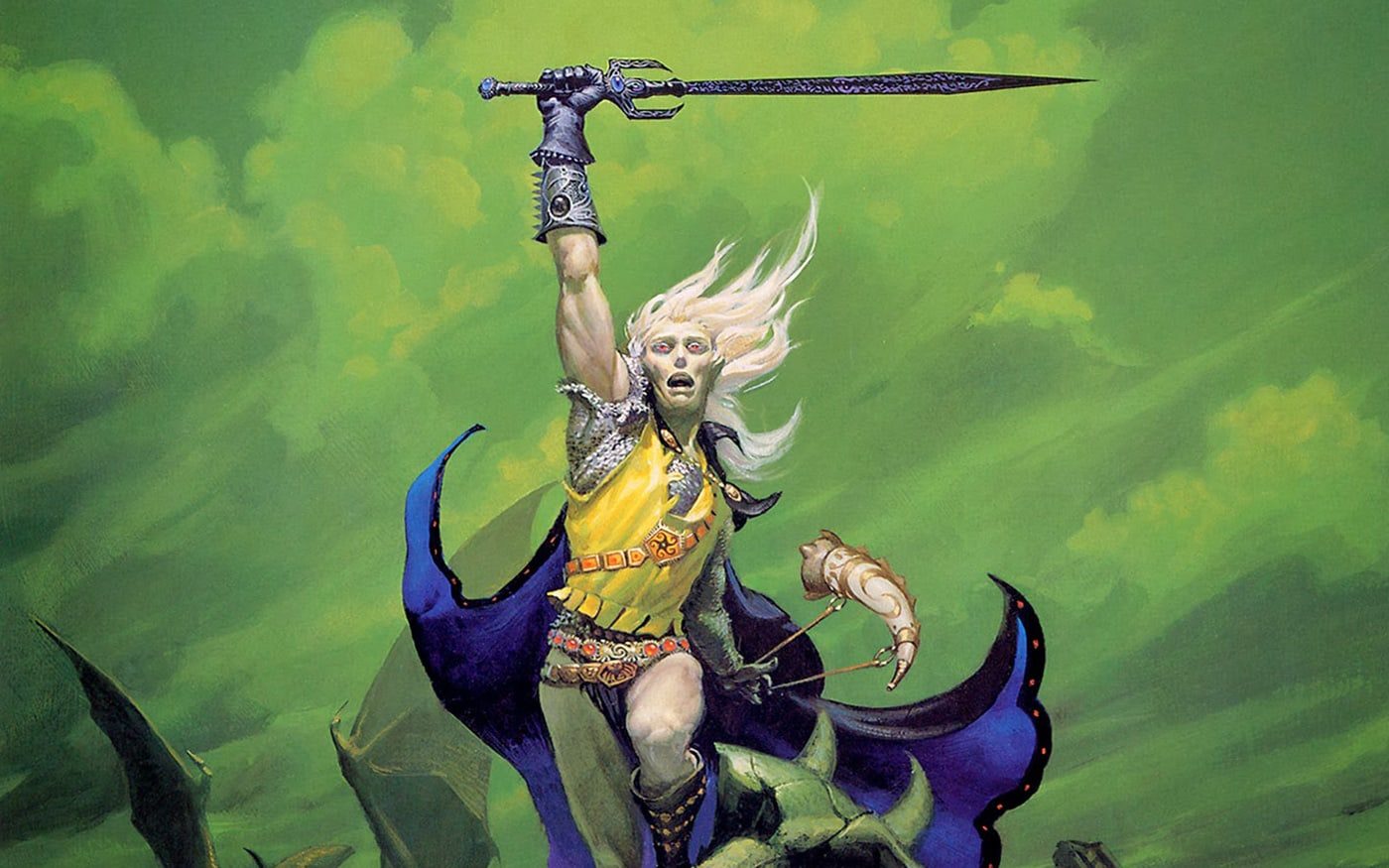The Trouble with Elric

I’ve been a fan of Michael Moorcock’s Elric saga for quite some time, ever since high school when I came across those exotically covered paperbacks in the library.
The Elric books are incredibly imaginative, full of ancient civilizations, wicked sorcerors, mighty magics, and the eternal struggle between Order and Chaos. And above all else, they feature arguably one of the most tragic heroes in all of fantasy literature, the albino warrior Elric of Melniboné, who is fated to destroy everything close to him and is inextricably tied to his soul-eating sword Stormbringer. And who doesn’t love a tragic hero?
However, when I’ve picked up the novels lately, I’ve found the unrelenting gloom and despair rather tedious, regardless of how skillfully and fantastically Moorcock writes.
For example, there’s this passage from the end of The Sailor on the Seas of Fate:
Outside in the middle of the square, at noon, still lay the lonely body of the last Vilmirian crewman. Nobody had known his name. Nobody felt grief for him or tried to compose an epitaph for him. The dead Vilmirian had died for no high purpose, followed no fabulous dream. Even in death his body would fulfill no function. On this island there was no carrion to feed. In the dust of the city there was no earth to fertilize.
Elric came back into the square and saw the body. For a moment, to Elric it symbolized everything that had transpired here and would transpire later.
“There is no purpose,” he murmured.
Perhaps his remote ancestors had, after all, realized that, but had not cared. It had taken the Jade Man to make them care and then go mad in their anguish. The knowledge had caused them to close their minds to much.
Or this passage from the end of Stormbringer, which brings Elric’s adventures to a close:
“But what is the meaning of it all?” Elric said. “That I have never fully understood.”
“Who can? Who can know why the Cosmic Balance exists, why Fate exists and the Lords of the Higher Worlds? There seems to be an infinity of space and time and possibilities. There may be an infinite number of beings, one above the other, who see the final purpose, though, in infinity, there can be no final purpose. Perhaps all is cyclic and this same event will occur again and again until the universe is run down and fades away as the world we knew has faded. Meaning, Elric? Do not seek that, for madness lies in such a course.”
“No meaning, no pattern. Then why have I suffered all this?”
“Perhaps even the gods seek meaning and pattern and this is merely one attempt. Look — ” he waved his hands to indicate the newly-formed earth. “All this is fresh and moulded by logic. Perhaps the logic will control the newcomers, perhaps a factor will occur to destroy that logic. The gods experiment, the Cosmic Balance guides the destiny of the earth, men struggle and credit the gods with knowing why they struggle — but do the gods know?”
“You disturb me further when I had hoped to be comforted,” he sighed. “I have lost wife and world — and do not know why.”
Both of these passages typify the existential gloom that permeates the novels. On the one hand, such gloom lends the novels a hard, sometimes cynical edge that is refreshing when compared to much of fantasy literature, which seems devoted to repeating the same Tolkien derivations again and again. Indeed, Moorcock wrote the series partly as a rejoinder to the works of Tolkien and C.S. Lewis. However, that same gloom and despair makes it difficult for me to find much ultimate value in the novels.
While I certainly appreciate and enjoy elements of Moorcock’s style, and the world in the novels is certainly creative and has few peers, there’s something rather soul-crushing about them, the cynicism and existential doom ultimately draining one, much as if they’d been stabbed by Stormbringer itself.